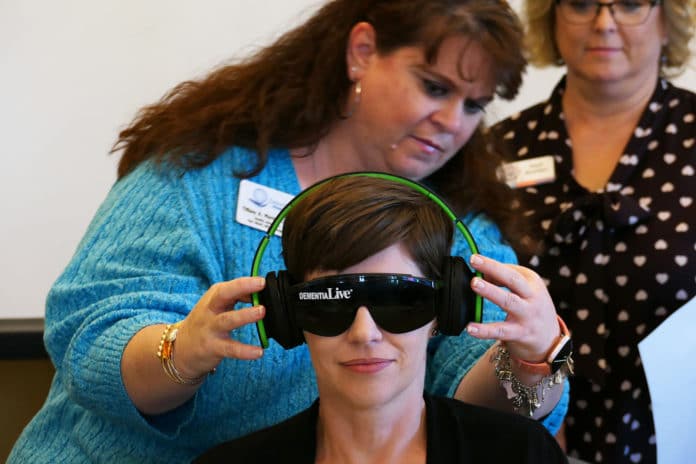America is aging. by the year 2030, the number of residents age 65 and older is expected to be the majority of those living here.
With that comes a growing need to accomodate people with dementia. Realizing this, the Fort Worth Public Library system is now certified as dementia friendly.
Dementia is defined as a chronic or persistent disorder of the mental processes caused by brain disease or injury and marked by memory disorders, personality changes and impaired reasoning. The term applies to more than 100 recognized forms of memory loss, with Alzheimer’s capturing the lion’s share of the discussion.
Dementia isn’t necessarily forgetting where you put your car keys, but it is about being unable to complete routine daily tasks.
“The Fort Worth Public Library is designed to be a welcoming place for everyone of all ages and abilities,” Adult Services Manager Jana Hill said. “Staff is trained to assist our patrons in a variety of ways, but the age-friendly and dementia-friendly certification gives us strategies to specifically and intentionally accommodate senior adult visitors or those who have dementia if they need special assistance.”
The certification came on the heels of staff members who experienced a recent “Dementia Live” demonstration by nonprofit Dementia Friendly Fort Worth. The demonstration featured a list of five tasks the participants were asked to attempt, such as filling out a library card application.
Gail Snider, program coordinator for Dementia Friendly, said that even tasks most take for granted can become difficult, but breaking down a process into steps can help.
“They may need more help than a regular patron,” she said. “It requires much more work on their behalf.
“Libraries are known for customer service. We have to go that extra step to help (those with dementia) so they can be successful.”
For example if someone has a hearing challenge, they sometimes are able to read lips, so it is important to be within a person’s field of sight. Also, in the case of a person’s diminished peripheral vision, it’s best to approach someone from the front so they won’t be startled.
Other ways to help patrons with dementia might be to provide a quiet space, and having patience to allow them time to understand a process. Sometimes it takes gentle investigating to understand why a person with dementia is behaving a certain way, often sparked by an unmet need that they cannot articulate.
This was the purpose of the demonstration, to familiarize staff members with the daily way of life for those dealing with dementia. After the demonstration, some staff members said they didn’t even hear the instructions they were given. As a result, most simply sat and waited.
“I was lost and confused,” Hill said. “I didn’t know what I was supposed to be doing. I felt isolated.”
The variety of feelings from staff members included fear, confusion, sensory overload, overwhelmed, isolated, and anxious. Snider said these feelings are similar to what people with dementia experience every day.
Libraries are a hub for social activity, so they can play a key role in the aforementioned battle process. In fact, making any public building or businesses more welcoming for people with dementia could go a long way in reducing the stigma.
“The library could be a touchstone for people with dementia,” said Mary Poole, RN and Dementia Program director for Christian Care Communities and Services.
“The longer (people with dementia) can be part of what’s going on in the community, the longer they can be successful,” Snider said.
Dementia is not a given with growing old. Also, there are things that can be done to battle its onset, the presentation displayed, such as a healthy diet, regular exercise and continued social activity, though these won’t prevent the disorder.
The exact cause of dementia has not been discovered.






